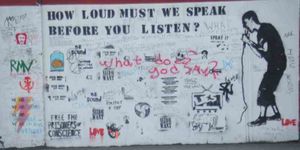Difference between revisions of "Web 2.0"
(→What is new about Web 2.0?) |
(→Learning from each other: engaging stakeholders using Web 2.0) |
||
| (15 intermediate revisions by the same user not shown) | |||
| Line 1: | Line 1: | ||
What is Web 2.0, and how can it be used to engage citizens and stakeholder groups in governance? | What is Web 2.0, and how can it be used to engage citizens and stakeholder groups in governance? | ||
| − | That is the theme of a talk Dr. David Newman gave at the [http://www.idc.com/getdoc.jsp?containerId=IDC_P13798 IT in Government 2007, Northern Ireland] conference. | + | That is the theme of a talk Dr. David Newman, of the [http://www.qub.ac.uk/mgt/ Queen's University Management School], gave at the [http://www.idc.com/getdoc.jsp?containerId=IDC_P13798 IT in Government 2007, Northern Ireland] conference. |
==Learning from each other: engaging stakeholders using Web 2.0== | ==Learning from each other: engaging stakeholders using Web 2.0== | ||
| + | [[Image:Dublin how loud speak.jpg|right|thumb]] | ||
| + | How do know that your customers are satisfied with your services? Should you be doing things differently? What do stakeholders want from government? To find out, you need to engage citizens. We now have ICTs that you can use to learn from stakeholders. With two-way communication, people don't just read what you tell them, but can tell you what they think is important. Dr. Newman will show how Web 2.0 tools can be used to acquire and manage knowledge from many people inside and outside your organisation, based on his extensive research into e-consultation. | ||
| − | + | #[[What is new about Web 2.0?]] | |
| + | #[[Uses of Web 2.0 in e-government]] | ||
| + | #Our work on e-consultation: [http://wiki.e-consultation.org/ study group] and [http://www.e-consultation.org/ research project] | ||
| + | #[[E-consultation and Web 2.0]] | ||
| − | + | ===Further reading=== | |
| − | |||
| − | |||
| − | |||
| − | |||
| − | + | *[http://www.e-consultation.org/ www.e-consultation.org], including: | |
| − | + | **[[Main Page|Guide to e-consultation]] (particularly the [[examples]] and [[technology classification]]), | |
| − | + | **and the [http://www.e-consultation.org/files/ecrp_report.pdf research report]. | |
| − | + | *[http://www.icele.org/ International Centre of Excellence for Local eDemocracy]. | |
| − | + | *[http://www.dowire.org/ Democracies Online]. | |
| − | + | *[http://www.netties2007.org/egov/papers.aspx EGOV 2007]. | |
| − | |||
| − | |||
| − | |||
| − | |||
| − | |||
| − | |||
| − | |||
| − | |||
| − | |||
| − | |||
| − | |||
| − | |||
| − | ** | ||
| − | |||
| − | |||
| − | ** | ||
| − | |||
| − | * | ||
| − | |||
| − | |||
| − | |||
Latest revision as of 23:22, 20 November 2007
What is Web 2.0, and how can it be used to engage citizens and stakeholder groups in governance?
That is the theme of a talk Dr. David Newman, of the Queen's University Management School, gave at the IT in Government 2007, Northern Ireland conference.
Learning from each other: engaging stakeholders using Web 2.0
How do know that your customers are satisfied with your services? Should you be doing things differently? What do stakeholders want from government? To find out, you need to engage citizens. We now have ICTs that you can use to learn from stakeholders. With two-way communication, people don't just read what you tell them, but can tell you what they think is important. Dr. Newman will show how Web 2.0 tools can be used to acquire and manage knowledge from many people inside and outside your organisation, based on his extensive research into e-consultation.
- What is new about Web 2.0?
- Uses of Web 2.0 in e-government
- Our work on e-consultation: study group and research project
- E-consultation and Web 2.0
Further reading
- www.e-consultation.org, including:
- Guide to e-consultation (particularly the examples and technology classification),
- and the research report.
- International Centre of Excellence for Local eDemocracy.
- Democracies Online.
- EGOV 2007.
